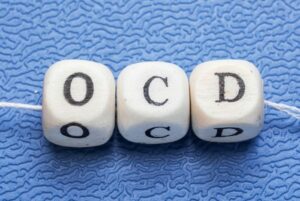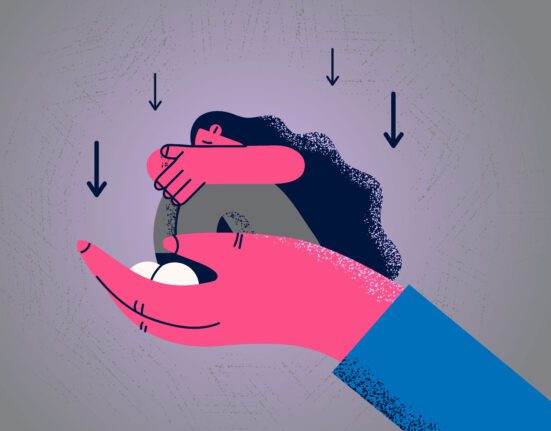Do you ever feel like you’re constantly in a hurry? Like you have to complete a certain task a certain way, or else something bad will happen? You may be experiencing some of the symptoms of high-functioning OCD. This type of OCD can be very frustrating and difficult to cope with, but there are ways that you can get help. In this blog post, we will discuss what high-functioning OCD is, as well as some strategies for coping with it.
Contents
What Is High-Functioning OCD?
 High-functioning OCD (Obsessive Compulsive Disorder) is a type of anxiety disorder that affects an individual’s thoughts, behavior, and emotions. It is characterized by intrusive, obsessive thoughts and compulsive behaviors that take up time, interfere with daily life, and cause distress.
High-functioning OCD (Obsessive Compulsive Disorder) is a type of anxiety disorder that affects an individual’s thoughts, behavior, and emotions. It is characterized by intrusive, obsessive thoughts and compulsive behaviors that take up time, interfere with daily life, and cause distress.
People with high-functioning OCD often appear to cope well with daily life. Because they are able to manage their symptoms and continue functioning in their jobs, social lives, and other activities. They often appear organized, efficient, and meticulous.
However, underneath this facade of normalcy lies an intense preoccupation with thoughts and actions that can be difficult to control. These obsessions cause the person to focus on the same worries or fears repeatedly and to feel compelled to do certain tasks in a specific way.
Are People With OCD High Achievers?
This is a common misconception about people with high-functioning OCD. While it may be true that some people with OCD are high achievers, this does not mean that all people with OCD are the same. The reality is, many people with high-functioning OCD experience an immense amount of distress and difficulty in managing their symptoms.
The term ‘high-functioning OCD’ is not an official clinical diagnosis. But it can be used to describe people who are able to manage the demands of their lives despite having symptoms of OCD. This means that they are able to work, attend school and socialize without major disruption from their condition.
However, this is not necessarily an easy thing to do. People with high-functioning OCD can experience a wide range of symptoms, some of which can be debilitating and interfere with their lives. Therefore, if you think you or someone you know has high-functioning OCD, it is important to get help.
How To Know If I Have High-Functioning OCD?
High-functioning OCD is a term used to describe people with Obsessive Compulsive Disorder (OCD) who are able to manage their symptoms and still lead relatively normal lives. People with high-functioning OCD may not be aware of the impact their condition has on them, or how it affects those around them.
Common signs and symptoms of high-functioning OCD include:
- Engaging in repetitive behaviors, such as checking and rechecking tasks or organizing items several times
- Excessive worrying about small details or potential mistakes
- Uncontrollable thoughts that cause anxiety
- Difficulty discerning which thoughts are real and which ones are intrusive
- Spending excessive amounts of time on tasks
- Avoiding certain activities or situations due to fear or anxiety
- Obsessing over cleanliness and hygiene
If these behaviors interfere with your daily life and cause distress, it is important to seek help from a mental health professional. Otherwise, the effects of high-functioning OCD can cause serious emotional and physical issues.
What Makes OCD Maladaptive?
 Maladaptiveness is often described as a lack of insight or impaired functioning. People with high-functioning OCD may struggle with intense, repetitive thoughts and behaviors that are not adaptive to their environment. Some beliefs are:
Maladaptiveness is often described as a lack of insight or impaired functioning. People with high-functioning OCD may struggle with intense, repetitive thoughts and behaviors that are not adaptive to their environment. Some beliefs are:
- Threat overestimation: It is common for people with OCD to overestimate the likelihood of negative consequences associated with their behaviors.
- Inability to tolerate uncertainty: People with OCD often have difficulty tolerating ambiguity or uncertainty, leading to an excessive need for certainty in decision-making.
- Inflated sense of responsibility: People with OCD may feel an exaggerated sense of responsibility for their own or other people’s well-being, leading to intense guilt when things don’t go as planned.
Generally, OCD is considered maladaptive because it interferes with the daily functioning of individuals. It may lead to social isolation, missed work or school obligations, and difficulty in fulfilling interpersonal relationships. There are various triggers that can cause a person’s OCD maladaptive behaviors to intensify, such as:
- Stress
- Fatigue
- Changes in routine
It is often difficult to manage the symptoms of high-functioning OCD, but there are some strategies that can help.
How To Cope With High-Functionig OCD?
Many people with high-functioning OCD struggle to cope on a daily basis. To manage these symptoms, it is important to focus on self-care and establish healthy habits that can help reduce the impact of OCD on your life. Here are some tips for coping with high-functioning OCD:
Practice Mindfulness & Meditation
Mindfulness and meditation can help you become more aware of your thoughts and feelings, while also helping to ground yourself in the present moment. By taking a few moments each day to practice mindfulness and meditation, you can better manage intrusive thoughts and combat anxiety associated with OCD.
Maintain a Routine
Having a consistent routine can provide structure to your day and make it easier to manage symptoms of OCD. Creating a schedule and sticking with it can also help you better manage stress. As well as reduce the amount of time spent ruminating on intrusive thoughts. You can also try implementing calming activities, such as yoga or journaling, into your daily routine.
Challenge Unhelpful Thoughts
Many people with high-functioning OCD find it hard to break free of the cycle of rumination and negative thoughts that can accompany OCD. It is important to remember that these intrusive thoughts are not always accurate or helpful and that it is possible to challenge them. It is important to not fight the thoughts but instead try to replace the unhelpful thought with something more positive and realistic.
Lifestyle Changes
This can include anything from getting enough sleep, eating healthily, and exercising regularly. Taking care of your physical health is important for overall well-being and can help reduce the impact of OCD. Additionally, engaging in activities that you enjoy can help to reduce stress levels and provide a sense of accomplishment.
Seek Professional Help
 If lifestyle changes are not sufficient, it is important to consider seeking professional help. Mental health professionals can provide invaluable guidance and support in managing OCD symptoms. They can also help you develop strategies for coping with intrusive thoughts, such as cognitive-behavioral therapy (CBT) or exposure response prevention (ERP). Finally, if needed, they can also prescribe medication as a treatment option.
If lifestyle changes are not sufficient, it is important to consider seeking professional help. Mental health professionals can provide invaluable guidance and support in managing OCD symptoms. They can also help you develop strategies for coping with intrusive thoughts, such as cognitive-behavioral therapy (CBT) or exposure response prevention (ERP). Finally, if needed, they can also prescribe medication as a treatment option.
High-functioning OCD can be difficult to manage, but it is possible with the right strategies and support. By focusing on self-care, establishing healthy habits, and seeking professional help if needed, you can better cope with your OCD symptoms and live a more fulfilling life.
Conclusion
To conclude, high-functioning OCD may seem like a contradiction in terms, but it is very real and can be debilitating for many individuals. It requires specialized treatment that combines both cognitive-behavioral therapies with medications to help reduce symptoms. Additionally, lifestyle changes can contribute to improved mental health overall.
Learning more about the condition may empower those who are living with it, as well as their support systems. Taking the proper steps to manage daily living with high-functioning OCD can ensure a better quality of life. With patience, understanding, and self-care, individuals can find ways to cope with this condition and lead happier healthier lives.
For more information and guidance, please contact OCDMantra. OCD is a mental health disorder characterized by obsessions and compulsions. If you have any queries regarding OCD treatment, ERP therapy experienced therapists at OCDMantra can help: Book a trial OCD therapy session


